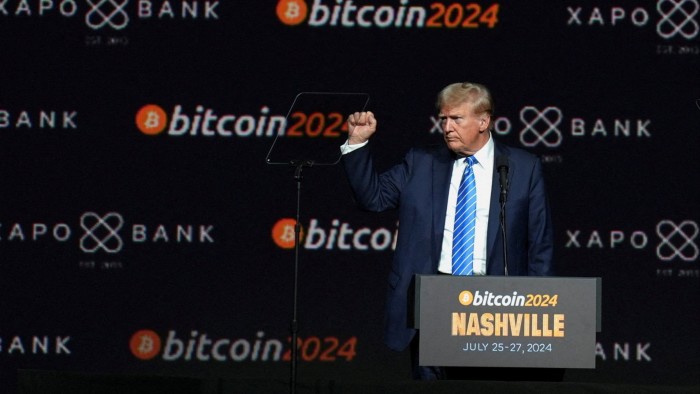Unlock the White House Watch newsletter for free
Your guide to what the 2024 US election means for Washington and the world
The US Department of Justice is scaling back cryptocurrency enforcement, the Trump administration’s latest move that is set to benefit an industry the president has championed.
In a memo to justice department employees, deputy US attorney-general Todd Blanche said the DoJ would no longer target crypto exchanges, mixing and tumbling services as well as wallets “for the acts of their end users or unwitting violations of regulations”, following an executive order Donald Trump signed in January.
Days after returning to the White House, Trump revoked measures that sought to address crypto risks, in an effort to “promote United States leadership in digital assets and financial technology”.
Blanche’s memo, which became public on Tuesday, is the latest sign the government is reversing the tough crypto scrutiny that was adopted by the previous administration. Under Joe Biden, the DoJ as well as securities and commodities regulators brought high-profile cases against crypto exchanges Binance and Coinbase and leading crypto lenders Genesis and Celsius.
Trump has instead picked crypto advocate Paul Atkins to head the Securities and Exchange Commission, which has in recent weeks dropped cases against Coinbase and Ripple Labs.
The letter throws into question the DoJ’s crypto investigations and prosecutions. A 2023 indictment charged the founders of Tornado Cash, a crypto mixing service, with money laundering and sanctions violations. The DoJ alleged Tornado Cash facilitated the laundering of more than $1bn in criminal proceeds, including hundreds of millions of dollars for Lazarus Group, a sanctioned North Korean cyber crime organisation.
The case was scheduled to go to trial in July. The Treasury department blacklisted Tornado Cash in 2022 and its web domain was shut down, but the sanction was lifted last month after an appeals court found Treasury lacked authority for the move.
Tornado Cash was not a defendant in the case. But Brian Klein, a lawyer representing Roman Storm, one of Tornado Cash’s founders, said: “We read this memo as supporting the dismissal of the case against Roman. As we’ve said all along, it should never have been brought.”
The DoJ did not immediately respond to a request for comment on Storm’s case.
Blanche dismantled the National Cryptocurrency Enforcement Team, which was set up during the Biden administration, accusing the previous government of pursuing “a reckless strategy of regulation by prosecution, which was ill-conceived and poorly executed”.
The major frauds unit will halt crypto enforcement in order to instead focus on immigration, procurement frauds and other priorities, he added.
The deputy attorney-general ordered prosecutors not to charge regulatory violations in crypto cases, “unless there is evidence that the defendant knew of the licensing or registration requirement at issue and violated such a requirement wilfully”.
He also barred prosecutors from charging violations of US securities and commodities laws that would require the DoJ to litigate whether a token is a security or a commodity, or in case there are other criminal charges available such as wire or mail fraud. This pulls the department away from a critical debate at the heart of crypto oversight. Biden-appointed securities and commodities regulators argued they had authority to oversee tokens on grounds that they qualified as either securities or commodities.
Blanche said the DoJ should instead prioritise enforcement linked to misconduct hurting investors, such as embezzlement of customer funds or crypto scams.

